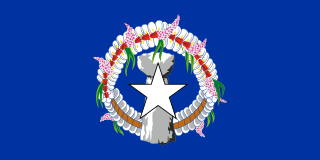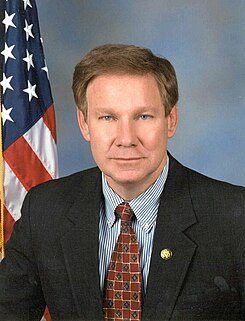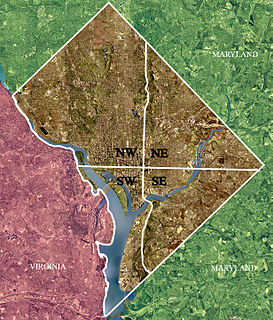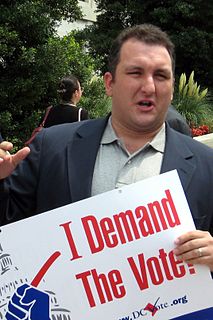The District of Columbia Olympic Committee was launched in 2005 as an effort to call attention to District of Columbia's lack of voting rights in the U.S. Congress.
The District of Columbia, American Samoa, Puerto Rico, Guam, the U.S. Virgin Islands, and the Northern Mariana Islands, while part of the United States, each only have one, nonvoting delegate in the U.S. House of Representatives. However, unlike those other American territories (except the Northern Marianas), D.C. lacks its own "National" Olympic Committee.
In late 2005, a group of D.C. residents, headed by Mike Panetta, launched the DC Olympic Committee (DCOC) with their first team, curling. Started with D.C. voting rights in mind, this advocacy group seeks to gain recognition from the International Olympic Committee (IOC) as an official member.
In 2008, the sport chosen was racewalking.

The Northern Mariana Islands, officially the Commonwealth of the Northern Mariana Islands, is an insular area and commonwealth of the United States consisting of 14 islands in the northwestern Pacific Ocean. The CNMI includes the 14 northernmost islands in the Mariana Archipelago; the southernmost island, Guam, is a separate U.S. territory. The CNMI and Guam are the westernmost territories of the United States.

Eleanor Holmes Norton is an American politician serving as a non-voting Delegate to the United States House of Representatives, representing the District of Columbia. As a non-voting member, Norton may serve on committees as well as speak on the House floor; however, she is not permitted to vote on the final passage of any legislation. She is a member of the Democratic Party.

Thomas Milburn Davis III is an American lobbyist and former Republican member of the United States House of Representatives who represented Virginia's 11th congressional district in Northern Virginia. Davis was considering a run for the U.S. Senate seat being vacated by five-term incumbent and fellow Republican John Warner in the 2008 election, but decided against it. He announced on January 30, 2008, that he would not seek reelection to an eighth term. Davis resigned from Congress on November 24, 2008.

United States attorneys represent the United States federal government in United States district courts and United States courts of appeals.
In the United States House of Representatives, a Committee of the Whole House is a congressional committee that includes all members of the House. In modern practice there is only one such committee, the Committee of the Whole House on the state of the Union, which has original consideration of all bills on the Union Calendar. While assembled the House may resolve itself temporarily into a Committee of the Whole House. Business can then proceed with various procedural requirements relaxed. At the conclusion of business, the committee resolves to "rise" and reports its conclusions or lack of conclusion to the speaker.

"51st state", in post-1959 American political discourse, is a phrase that refers to areas or locales that are—seriously or facetiously—considered candidates for U.S. statehood, joining the 50 states that presently compose the United States. The phrase has been applied to external territories as well as parts of existing states which would be admitted as separate states in their own right.

Territories of the United States are sub-national administrative divisions overseen by the United States government. The various U.S. territories differ from the U.S. states and Native American tribes in that they are not sovereign entities. Territories are classified by incorporation and whether they have an "organized" government through an organic act passed by Congress. U.S. territories are under U.S. sovereignty and may be treated as part of the United States proper in some ways and not others. Unincorporated territories in particular are not considered to be integral parts of the United States, and the Constitution of the United States applies only partially in those territories.

The District of Columbia statehood movement is a political movement that advocates making the District of Columbia a U.S. state. The District of Columbia is a federal district under the direct jurisdiction of the United States Congress. Unlike nearly all other states and territories that contain multiple cities, the District of Columbia only contains one (Washington), having subsumed the formerly separate municipality of Georgetown. Statehood would grant the District voting representation in the Congress and full control over local affairs. For most of the modern (1980–present) statehood movement, the new state's name would have been "New Columbia", although the Washington, D.C. Admission Act of 2020 refers to the proposed state as "Douglass Commonwealth."
Commonwealth is a term used by two unincorporated territories of the United States in their full official names. The territories are: the Northern Mariana Islands and Puerto Rico.
In the United States, each state has its own written constitution.
Non-voting members of the United States House of Representatives are representatives of their territory in the House of Representatives, who do not have a right to vote on proposed legislation in the full House but nevertheless have floor privileges and are able to participate in certain other House functions. Non-voting members may vote in a House committee of which they are a member and introduce legislation. There are currently six non-voting members: a delegate representing the District of Columbia, a resident commissioner representing Puerto Rico, and one delegate for each of the other four permanently inhabited US territories: American Samoa, Guam, the Northern Mariana Islands, and the US Virgin Islands. A seventh delegate, representing the Cherokee Nation, has been formally proposed but not yet seated, while an eighth, representing the Choctaw Nation, is named in a treaty but has neither been proposed nor seated. As with voting members, non-voting delegates are elected every two years, and the resident commissioner of Puerto Rico is elected every four years.

Voting rights of citizens in the District of Columbia differ from the rights of citizens in each of the 50 U.S. states. The Constitution grants each state voting representation in both houses of the United States Congress. As the federal capital, the District of Columbia is a special federal district, not a state, and therefore does not have voting representation in Congress. The Constitution grants Congress exclusive jurisdiction over the District in "all cases whatsoever".

Michael Joseph "Mike" Panetta was the District of Columbia shadow representative, from January 2007 through January 2013.

The United States House of Representatives election in the Northern Mariana Islands, 2008 took place on November 4, 2008 and was the Northern Mariana Islands' first election of a delegate to the United States House of Representatives. Since the CNMI traditionally had general elections in odd-numbered years, the November 2008 ballot contained only this office.

The District of Columbia and United States Territories quarters were a series of quarters minted for one-year by the United States Mint in 2009 to honor the District of Columbia and the unincorporated United States insular areas of Puerto Rico, Guam, the United States Virgin Islands, American Samoa, and the Northern Mariana Islands. The islands commonly grouped together as the United States Minor Outlying Islands were not featured, as the law defined the word "territory" as being limited to the areas mentioned above. They followed the completion of the 50 State Quarters Program. The coins used the same George Washington obverse as with the quarters of the previous 10 years. The reverse of the quarters featured a design selected by the Mint depicting the federal district and each territory. Unlike on the 50 State quarters, the motto "E Pluribus Unum" preceded and was the same size as the mint date on the reverse.

John James Capozzi, Jr. (D) served as the second District of Columbia Shadow U.S. Representative, during 1995-1997 and is a former 17 year at-large member of the District of Columbia Democratic State Committee. He ran as a Candidate to become an At-Large Councilmember on the Council of the District of Columbia and was defeated September 10, 1996. He previously worked for BRMi Consulting as a Recruitment Manager. Currently, Capozzi works for the Office of the Chief Technology Officer of the District of Columbia as a Project Manager.
Voting rights of citizens in Guam differ from those of United States citizens in each of the fifty states. In the U.S. House of Representatives, Guam is entitled to a delegate, who is not allowed to vote on the floor of the House, but can vote on procedural matters and in House committees. Citizens of Guam may not vote in general elections for President.











